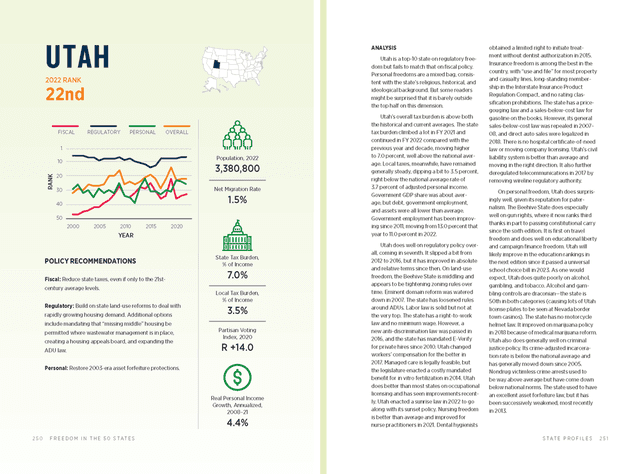Policy Recommendations
- Fiscal Reduce state taxes, even if only to the 21st-century average levels.
- Regulatory Build on state land-use reforms to deal with rapidly growing housing demand. Additional options include mandating that “missing middle” housing be permitted where wastewater management is in place, creating a housing appeals board, and expanding the ADU law.
- Personal Restore 2003-era asset forfeiture protections.
Analysis
Utah is a top-10 state on regulatory freedom but fails to match that on fiscal policy. Personal freedoms are a mixed bag, consistent with the state’s religious, historical, and ideological background. But some readers might be surprised that it is barely outside the top half on this dimension.
Utah’s overall tax burden is above both the historical and current averages. The state tax burden climbed a lot in FY 2021 and continued in FY 2022 compared with the previous year and decade, moving higher to 7.0 percent, well above the national average. Local taxes, meanwhile, have remained generally steady, dipping a bit to 3.5 percent, right below the national average rate of 3.7 percent of adjusted personal income. Government GDP share was about average, but debt, government employment, and assets were all lower than average. Government employment has been improving since 2011, moving from 13.0 percent that year to 11.0 percent in 2022.
Utah does well on regulatory policy overall, coming in seventh. It slipped a bit from 2012 to 2016, but it has improved in absolute and relative terms since then. On land-use freedom, the Beehive State is middling and appears to be tightening zoning rules over time. Eminent domain reform was watered down in 2007. The state has loosened rules around ADUs. Labor law is solid but not at the very top. The state has a right-to-work law and no minimum wage. However, a new anti-discrimination law was passed in 2016, and the state has mandated E-Verify for private hires since 2010. Utah changed workers’ compensation for the better in 2017. Managed care is legally feasible, but the legislature enacted a costly mandated benefit for in vitro fertilization in 2014. Utah does better than most states on occupational licensing and has seen improvements recently. Utah enacted a sunrise law in 2022 to go along with its sunset policy. Nursing freedom is better than average and improved for nurse practitioners in 2021. Dental hygienists obtained a limited right to initiate treatment without dentist authorization in 2015. Insurance freedom is among the best in the country, with “use and file” for most property and casualty lines, long-standing membership in the Interstate Insurance Product Regulation Compact, and no rating classification prohibitions. The state has a price-gouging law and a sales-below-cost law for gasoline on the books. However, its general sales-below-cost law was repealed in 2007–08, and direct auto sales were legalized in 2018. There is no hospital certificate-of-need law or moving company licensing. Utah’s civil liability system is better than average and moving in the right direction. It also further deregulated telecommunications in 2017 by removing wireline regulatory authority.
On personal freedom, Utah does surprisingly well, given its reputation for paternalism. The Beehive State does especially well on gun rights, where it now ranks third thanks in part to passing constitutional carry since the sixth edition. It is first on travel freedom and does well on educational liberty and campaign finance freedom. Utah will likely improve in the education rankings in the next edition since it passed a universal school choice bill in 2023. As one would expect, Utah does quite poorly on alcohol, gambling, and tobacco. Alcohol and gambling controls are draconian—the state is 50th in both categories (causing lots of Utah license plates to be seen at Nevada border town casinos). The state has no motorcycle helmet law. It improved on marijuana policy in 2018 because of medical marijuana reform. Utah also does generally well on criminal justice policy. Its crime-adjusted incarceration rate is below the national average and has generally moved down since 2005. Nondrug victimless crime arrests used to be way above average but have come down below national norms. The state used to have an excellent asset forfeiture law, but it has been successively weakened, most recently in 2013.

